Climate and energy
Mathieu Brugidou,
Jeremy Bouillet
-

Available versions :
EN
Mathieu Brugidou
Jeremy Bouillet
The health crisis triggered by the Covid-19 pandemic, and perhaps above all the war in Ukraine, together with increasingly outspoken Chinese and/or American interventionism, have largely contributed to "breaking European energy taboos"[1] towards more collective and coordinated approaches. This is undeniable in the field of energy: if certain mechanisms such as the general cap on gas prices have not been adopted, some measures, which were hard to imagine at European level until recently, have now been ratified, such as joint gas purchases, shared objectives for reducing energy demand, the obligation to store energy, etc. The importance of the European level has therefore been established when it comes to energy issues. To date, three factors can be noted. Firstly, the Green Deal has become a robust instrument to the extent that it is now part of the May 2022 REPowerEU plan. This means, on the one hand, that renewable energies (RE) are clearly presented as one of the solutions to be developed; on the other, that the issue of energy demand is once again gradually becoming a priority, with objectives for efficiency and the reduction of consumption[2]. Secondly, it is clear that the end of fossil fuels will not be immediate: in the European Parliament, the coalitions opposing gas are gradually weakening, and the deployment of LNG terminals and the development of hydrogen[3] offer possibilities for an extension of the use of these energies in terms of public policy. Finally, nuclear energy seems to appear to have become a credible alternative again, thanks to the discussion on European level green taxonomy; and the political window of opportunity which places the imperative of energy security squarely at the centre of the energy debate. These elements form a new energy landscape that identifies four possible levers of action, within the dual frame of decarbonising economies and improving Europe's energy independence: renewables, nuclear, gas and efficiency/sobriety. These four poles define, as it were, the boundaries of the possible energy mixes within which the Member States position their national energy policies. The democratic framework of the States considered here requires that public opinions be taken into account. Indeed, the challenges of energy and environmental transitions are such, especially when they affect infrastructures or changes in practices, that they cannot be resolved without the inclusion of the citizens. Of course, the debate is great regarding how complex it is to limit public opinion to the results of surveys and on the quality of that opinion (Converse 2006). There is also some evidence to question the role of public opinion in shaping public policy and the nature of political decisions (Belot 2019). Two types of theory appear relevant here to understand recent developments in European public opinion regarding energy issues. Based on the intuitive notion of a disaster transforming the public agenda and the priorities for public action, John Kingdon (1984; 2013) proposes the notion of focusing event[4]. It is a sudden - and relatively rare - event, harmful or revealing possible harm, limited to a geographical area and of which the political decision-makers and the public become simultaneously aware (Gamson 1992). This event, which at the same time focuses the attention of the public and policy-makers on a problem, opens a window of opportunity and can lead to a major and relatively rapid reconfiguration of the public policies concerned (policy learning[5]). The second theory concerns the nature of public opinion. In short, we agree with Zaller (2001) that opinions can vary according to the level of exposure to information, or the degree of political competence of individuals; that citizens do not always have stable attitudes on all issues and that opinions are partly formed by the discourses carried out in public arenas. Zaller specifies, in particular, by taking up the notion of latent public opinion formulated by Key (1961), a conception of public opinion that is often divided on an issue between considerations that are, if not contradictory, at least in tension; and the kind of symmetrical role played by political representatives whose "instincts and motivations are to anticipate what the public will want at the end of the day and after the dust has settled" (Zaller 1998, 29). These two types of analytical resources are necessary and must be combined, in our opinion, if we are to understand the sometimes-rapid changes that have taken place in recent years in terms of public support for nuclear energy. In all the countries where we have data, there has been an overall increase in support for nuclear energy, which is perhaps not unrelated to the window of opportunity opened at European level. We are interested in the trends in support for energy in several comparable European countries and how these have occurred. The shift from a risk-based framework, due to the health crisis, to an economic-based framework, this time essentially linked to the war in Ukraine, is a factor. The last part of this text focuses on the French case, about which we have more precise data, and which shows that beyond the question of framing on a European scale, there are national specificities, which are largely due to the recent political (and electoral) cycles that give a very particular tempo to the dynamics of opinion. In terms of methodology, we use data from: - Obs'COP, an international observatory of opinions, knowledge, expectations and levels of commitment to climate change covering some 30 countries. - Dynamics of public opinion on the new nuclear power plant (DOP), a survey conducted in France. Obs'COP data are used in the first part on the Euro-European comparison. The DOP data, with the French focus, in the following part. Their perimeter, questionnaire and methodology are different, which does not allow for a strict comparison from one part to the other.
On the changing public opinion of some European democracies regarding nuclear power
Sixteen countries[6] in Europe have nuclear power generation facilities in their energy mix. Notably shaken by the Chernobyl[7] and Fukushima accidents [8], Some countries, such as Germany, Belgium, Spain and Switzerland, announced their intention to phase out nuclear power. Faced with the energy crisis triggered by the war in Ukraine, Belgium has decided to postpone the phase-out by ten years, while Germany has decided to postpone it by a few months to get through the winter[9] , while Spain and Switzerland have planned to phase out nuclear power in 2035 and 2034 respectively. About ten countries[10] - six of which are in Central Europe - are building or have announced the construction of new power plants. The study focuses on a share of the so-called advanced economies of Europe for which we have data on public opinion and energy, and which allow us to make comparisons with the French case in terms of spaces of hierarchical political identities (Lipset and Rokkan 1967; Delfosse 2008). In our panel, the situation in Western and Nordic Europe is contrasted as Germany has decided to phase out nuclear power; Belgium, after a similar decision, is prolonging the operation of its existing plants while France[11] like the UK have embarked on a programme to build new power plants. In Southern Europe, nuclear phase-out dominates, as Italy has been nuclear-free since the 1987 referendum and Spain plans to close its seven remaining reactors in the near future. However, the study has one important limitation: the countries of Central and Eastern Europe, with a more modest energy mix but often with a nuclear tradition and committed to construction programmes, are not taken into account.
One conclusion: the war in Ukraine, a focal event that is increasing support for nuclear power
Regardless of countries' decisions on nuclear power (building programme, shutdown or announced shutdown), by 2022 there was a net increase in support for nuclear power[12] (Fig. 1). This increase is particularly strong in countries where anti-nuclear positions are predominant and entrenched, such as Italy (+18 points) or Germany (+15), and more moderate but notable in countries committed to a nuclear phase-out path, such as Belgium (+12 points) or Spain (+13). The United Kingdom, which is committed to a new nuclear programme, shows a stronger increase (+14) than France, whose support for nuclear power in September 2021 was already high. These developments have taken place to the detriment of opinions that are very much opposed to nuclear power, particularly in countries that have historically been hostile to this type of energy (Germany and Italy). In all of these European countries, public support for renewable energies (RE) is strong: support for solar is particularly high in Germany, Spain, Italy and the UK. French support for wind energy is lower than elsewhere and countries with little involvement in hydroelectricity such as Germany and the UK are less supportive of this energy.
Figure 1. Changes in support for nuclear energy
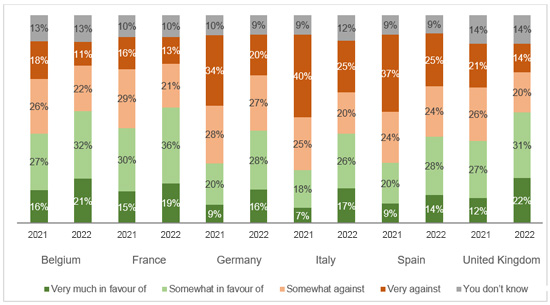
The case of fossil fuels is interesting (Fig. 2). There are two distinct groups of countries: those where support for nuclear power is strong with lower support for thermal energy (Belgium, France, United Kingdom); and those where support for nuclear power is weaker with higher support for fossil energy (Germany, Italy, Spain). These levels of support are broadly related to the distribution of national energy mixes.
Figure 2. Levels of support for different modes of electricity generation in 2022
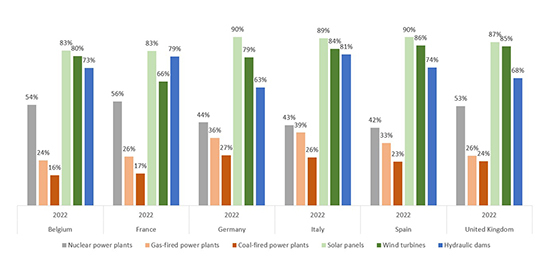
Between 2019 and 2020, the variations in support in the opinion first and foremost affected RE: the levels of support for renewables increased significantly in Belgium, the United Kingdom and, more selectively, in Germany (where only support for solar increased). In Italy, however, support is declining. But almost symmetrically, between 2021 and 2022, it is the increase in support for thermal (gas and coal) and nuclear energy that stands out (Fig. 3). On average, the relative evolution between 2021 and 2022 is +18% for the use of gas-fired power stations, +28% for nuclear, +39% for coal-fired power stations, while support decreased or stabilised for RE - but with support levels in 2022 often above 70%.
Figure 3. Relative change in support for electricity generation between 2021 and 2022
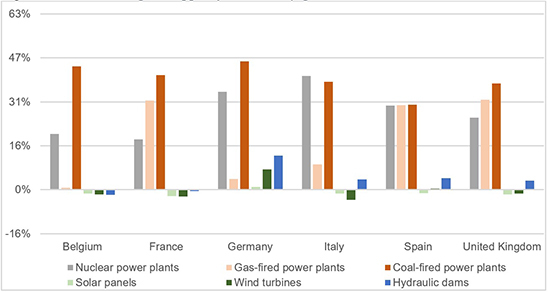
It can safely be assumed that these rapid changes are due to the war in Ukraine, which together focus the attention of public opinion, the media and political representatives on energy issues, particularly because of the consequences of the conflict on energy costs, its inflationary effects and its repercussions on Europeans' purchasing power, thereby rehabilitating the idea of a more diversified energy mix and sources of production that had been abandoned in previous years. This is shown in particular by the trend regarding the question on the 'most important issues' for public opinion in these different countries (Fig. 4). This issue captures the problem(s) that focus the public's attention and constitute macro-frameworks for them; most of the issues in the public debate - including energy issues - are perceived through the prism of these concerns. The changes in response to this question for the period 2020, 2021 and 2022 show a clear decline in risk-related concerns, due to the ebb of the Covid-19 pandemic in Europe, but also a continuation of environmental concerns, as well as a very strong increase in 2021 and 2022 in the cost of living, which dominates public opinion in the European countries studied. There has also been an increase in topics linked to the cost of living, such as poverty and taxes. In other words, there has been a shift from a focus on risk and the environment, traditionally unfavourable to nuclear power in particular, to an economic and environmental focus. However, this economic framing is often more favourable to nuclear power when addressing issues of competitiveness, employment, purchasing power, etc. (Blanchard 2010; Persico 2014).
Figure 4. Main concerns in Belgium, France, Germany, Italy, Spain and the UK

Politicization of energy issues to the benefit of nuclear power?
The consequences of the war in Ukraine on the hierarchy of public concerns and, especially, energy stakes, are partly the result of a partisan interpretation. Indeed, we know that support for nuclear power in France is subject to partisan readings (Brouard et al. 2013); for example, between 2007 and 2011, the Socialist Party moved closer to the position of the Greens, who are traditionally opposed to the use of nuclear power, in view of an electoral agreement (Deront, Evrard, and Persico 2018). Conversely, the centre, the right, and even the far right appear to be consistent supporters of nuclear power. This polarisation of support for nuclear power is true for all the European countries considered in our study, with left-wing or environmentalist parties on average being more opposed, and centre or right-wing parties more favourable. However, it is worth noting that in the UK, green voters are relatively favourable to nuclear power and that in Italy, right-wing voters show little support for nuclear energy (unlike the centre). The changes in public opinion triggered by the war in Ukraine and its consequences in the European and national public debates do not show any marked differences between the left and the right: overall, support for nuclear energy is increasing everywhere (Fig. 5). However, some national specificities can be noted: for instance, Italian right-wing voters are joining the European right-wing trend, while French Green and German left-wing supporters are converging towards more pro-nuclear positions. The most notable trend concerns respondents with no party affiliation who, in all the countries concerned, are shifting from relative opposition to a more balanced position, if not to support nuclear energy - and it is important to remember that they represent one third of the respondents to the survey. The explanation provided by the theory of the focusing event seems to be broadly valid in explaining the development in public opinion in the countries considered in the study. The same shock leads to a change in the framing of the issues and seems to be subject to similar interpretations regardless of any partisan affiliations (or lack thereof) considered. The approach we have adopted is, for the purposes of comparison, quite macroscopic in that it focuses on the transition from 2021 to 2022 due to the war in Ukraine. It does not consider the history and trajectory of energy as a public concern preceding this event. Yet, for some of the countries considered[13] , this trajectory has been marked by episodes of politicization of energy issues. This is notably the case in France, which experienced two electoral cycles in 2021 and 2022 (even before the war in Ukraine) - in 2021 (regional elections) and 2022 (presidential and legislative elections) - whose campaigns were strongly marked by controversies over energy choices.
Figure 5. Development in rates of support for nuclear power according to political position
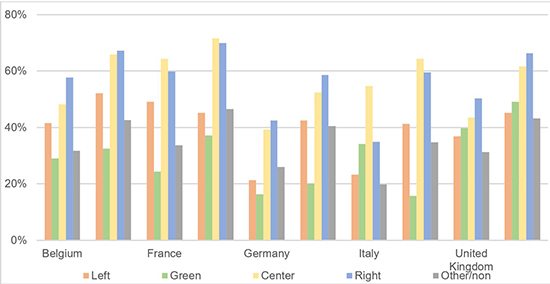
The specific case of France: renewed public support for nuclear power, which owes much to political events
This initial analysis can be extended, in the case of France, by the results of a series of barometric questions on the future of nuclear power, designed in particular to distinguish the impact of the agenda (or context) on the development of public opinion (elections, war in Ukraine, etc.) from the more specific effects of information (Gerstlé 1996) and, more specifically, of argumentation (Schemeil et al. 2012). In the DOP survey, two questions asked in the same way about the future of nuclear power [14] are framed (before and after) by opposing, detailed narratives on the energy scenarios: one always highlights the benefits of a 100% RE energy mix, the other always those of a mix of RE and nuclear. This was repeated three times: in October 2020, June 2021 and June 2022. Analysis of the results for the year 2020 shows contrasting results: opinions on future nuclear use before and after the narratives balance each other out (Fig. 6). In the end, respondents are in three balanced thirds between 'for', 'undecided' and 'against'; the changes in opinion linked to the detailed narratives cancel each other out. Similarly, in 2021, the politicization of energy issues does not seem to have produced any noticeable pre-narrative effects. On the other hand, the effects of debate (via exposure to the narratives) appear to be much more significant and, above all, unbalanced: the narrative of a nuclear/RE energy mix gains 8 points, while that of a 100% renewable energy mix loses 9 points. In other words, in the context of 2021, after regional elections marked by an anti-wind campaign, notably from the far right and part of the right wing, the argument turned in favour of nuclear. In June 2022, the impact of the agenda before any detailed narrative is strong: before the narrative, 53% of respondents say they are favourable to nuclear power (+15 points compared to 2021). The presidential election strongly politicized energy issues[15] ; the war in Ukraine also highlighted Europe's energy dependence on Russian gas, and its effect on energy prices probably explains these developments. In 2022, the survey again shows the effect of a pro-nuclear argument, with support rising by a further 5 points before and after detailed narratives (taking the rise in pro-nuclear opinion to 20 points compared to the first question on the future of nuclear power in 2021).
Figure 6. Changes in support levels for nuclear use in the future before and after narratives in 2020, 2021 and 2022
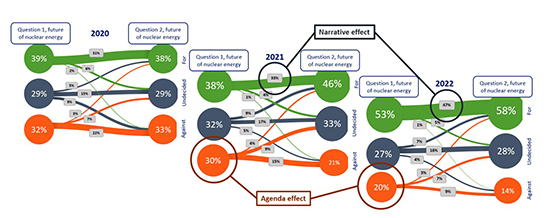
The development in choices between the different energy mix narratives provides a better understanding of the dynamics of opinion on nuclear power: in 2021, the 100% RE narrative fell by 9 points compared to 2020; the RE/nuclear mix narrative only increased by 3 points. In other words, in 2021, there was a decline in the attractiveness of the 100% RE scenario rather than an increase in the nuclear mix[16]. In 2021, the results suggest a priming effect (Iyengar and Kinder 2010) due to the politicization of energy questions, and in particular renewable energy, following the regional elections: nuclear power was rarely mentioned by the candidates, except as an alternative for some of them to wind power development projects deemed excessive at a local level The answers on the future of nuclear power thus varied little between 2020 and 2021. It was only after the choice between two scenarios was explicitly mentioned in the survey that respondents switched to nuclear power in the second question regarding the future of nuclear power. In 2022, support for nuclear power increased, driven by the presidential election and the war in Ukraine.
***
What have we learned about the development of (part of) European public opinion? Two lessons appear to us to be worth drawing from an initial comparison: - These developments in European opinion (or at least in the countries for which we have data) are, at first glance, relevant to focusing events, since a sudden, poorly anticipated event, the harmful consequences of which for Europe appear rapidly, simultaneously has focused the attention of European public opinion and policy-makers and seems to have led, via a reframing of the problem (framing theory, Benford and Snow 2012), to an in-depth rethink in terms of public energy policies. - It is possible to show that the rise of nuclear power in public opinion clearly precedes the outbreak of war in Ukraine: in France, it was initiated by two electoral cycles in 2021 and 2022, and this has framed energy issues locally and then nationally. In our view, this dynamic is first and foremost an approach in terms of latent public opinion that would be shaped by partisan systems, where 'politicians try both to anticipate and to shape - to follow and to lead - public attitudes' (Zaller 1998). The effects of a focusing event are interpreted through the prism of national frameworks and trajectories, which have different temporalities: short for the politically charged periods and longer if we consider national public policies or the emergence of macro-frameworks such as climate change. These analyses also consider the deeply ambivalent or divided nature of pro-nuclear opinions and their capacity to evolve, without being irrational, in a sometimes very rapid manner. The reasons for not choosing nuclear power have not disappeared, but they have become less decisive: In France, Germany and the UK, for example, between 60% and 70% of respondents to the 2022 Sustainability Barometer[17] believe that an underground nuclear waste disposal site is very or fairly dangerous for people living nearby, yet more of them opt for nuclear energy than in 2021. This type of analysis finally gives us the keys to understanding what is at stake at European level: for example, France's recent initiative leading eleven European Union Member States (including many Central and Eastern European countries) to reassert their wish to strengthen cooperation in the nuclear field and the opposition of countries such as Germany, Austria and Spain to making nuclear power a European priority. It reminds us that while the relationship between public policy and public opinion is not simple, in a democracy, they are closely dependent on each other.
[1] Contexte, 24 February 2023
[2] Preparing for the next winter: Europe's gas outlook for 2023', Bruegel,Institute 2 February 2023 Contexte, 10 February 2023
[3] "Gas companies regain control over hydrogen"", Context, 10 February 2023
[4] Like Chernobyl or Fukushima for nuclear power, but also natural disasters like a flood or an earthquake, such as the one in Turkey in February 2023.
[5] This window corresponds to the alignment of the streams of policy (public policy solutions), politics (partisan preferences, government, interest groups and public opinion) and public issues.
[6] Belgium, Bulgaria, Czech Republic, Germany, Hungary, Finland, France, Lithuania, Netherlands, Romania, Slovakia, Slovenia, Spain, Sweden, Switzerland, UK.
[7] After the Chernobyl disaster, new construction almost stopped in Europe, with only seven reactors being built in twenty years. https://www.fondapol.org/en/study/nuclear-energy-changing-the-balance-of-power/
[8] However, the nuclear phase-out in Belgium and Germany was under discussion long before the Fukushima accident, in 2003 for Belgium, with Fukushima accelerating the process in Germany. Italy decided by referendum to get out of nuclear power after the Chernobyl disaster in 1987
[9] The last three nuclear power plants in operation, with a total net capacity of 4055 MW, will be extended until 15 April 2023.
[10] Bulgaria, Czech Republic, Finland, France, Hungary, Netherlands, Poland, Romania, Slovakia, United Kingdom.
[11] The Flamanville EPR is under construction and a programme of three times two EPR2 units (optimised EPR) is the subject of a public debate.
[12] Illustrated here only between 2021 and 2022, several barometers show a gradual rise in support for nuclear power since 2019.
[13] Germany, Italy and France had elections in 2021 or 2022: the legislative or presidential elections in Germany or Italy were not marked by debates on energy issues, unlike in France. Cf. the electoral chronicles of the European Elections Monitor. https://www.robert-schuman.eu/en/the-european-elections-monitor/2023/
[14] "Do you agree or disagree with using nuclear power to produce the electricity we will need in the future?" with the question first asked before the narratives, then after the narratives
[15] And in particular the choice of new nuclear power following President Macron's speech in Belfort.
[16] The questions concerning the "perception" of the future of the various renewable energies (whose support base remains the majority) confirm these analyses: between 2020 and 2021, solar energy - admittedly starting from a very high base - lost 24 points, onshore wind turbines lost 9 points, with only offshore wind turbines escaping this (relative) dislike by gaining 11 points.
[17] Sustainability Barometer 2022, Jérôme Cubillé
Publishing Director : Pascale Joannin
On the same theme
To go further
Climate and energy
Valérie Plagnol
—
22 April 2025
Freedom, security and justice
Jean Mafart
—
15 April 2025
Asia and the Indo-Pacific
Pierrick Bouffaron
—
8 April 2025
Democracy and citizenship
Radovan Gura
—
25 March 2025

The Letter
Schuman
European news of the week
Unique in its genre, with its 200,000 subscribers and its editions in 6 languages (French, English, German, Spanish, Polish and Ukrainian), it has brought to you, for 15 years, a summary of European news, more needed now than ever
Versions :




